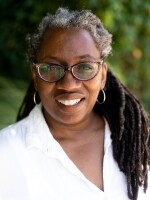In this three-episode limited podcast, St. Louis Public Radio’s Marissanne Lewis-Thompson explores why more Black families are choosing to homeschool, what it’s like behind the scenes, and what the kids really think!
At the start of the pandemic, Black families chose to homeschool nearly five times more than any other racial group in the U.S.
In a three episode arc, newscaster and reporter Marissanne Lewis-Thompson talks with Black parents (including her own), academics and school kids about their experiences with traditional schooling and the challenges that left them searching for a better way.
You’ll meet Black families in the St. Louis area who made the decision to homeschool, some already a decade into their homeschooling journey.
Lewis-Thompson takes you into the heart of their homeschool hustle-and-bustle to experience families doing school on their own.
Along the way, these parents discuss the weight of making the decision to homeschool, the joy of creating a safe space and tailor-made curriculum for Black children, and the challenge of finding the right fit for each child.
“What I appreciated most about my time with these families is their honesty,” Lewis-Thompson said. “Homeschooling has been a benefit to them, but that doesn’t mean it doesn’t come with its challenges. The reality is not every kid is the same and not every kid likes all aspects of homeschooling.”
COVID accelerates a trend
All the same, the pandemic appeared to be the tipping point for many Black families. According to the U.S. Census Bureau’s Household Pulse Survey, the proportion of Black families homeschooling sprang from 3.3% in May of 2020 to 16.1% by September the same year. That trend is evident among Black families in Missouri and in locales all over the country.
COVID presented many families with a front-row seat to their children’s daily school experience for the first time. With that came new urgency to act on long-held concerns about poorly performing schools, bias against Black children in the classroom, and a curriculum that does not positively reflect their children, culture or the contributions of Black people in the US.
Among the families interviewed in Doin’ It Our Way, there were striking examples among kids and adults alike.
“Seeing Black kids thriving academically always makes my heart smile,” Lewis-Thompson said. “I knew going into this that some of the kids had bad experiences in a traditional classroom. It affected their confidence and changed how they learned in the classroom. Some were actively ignored by their teachers, some cried often, and others felt like they’d lose friends if they continued to be successful in the classroom.
“Hearing those stories from their parents made me curious about how a change in environment could reshape their mindset about learning. It was so cool to see in real time that transformation,” Lewis-Thompson said.
All three episodes of Doin’ It Our Way are available on September 15, wherever you get your podcasts. To learn more about the limited podcast series, visit stlpr.org/our-way.



